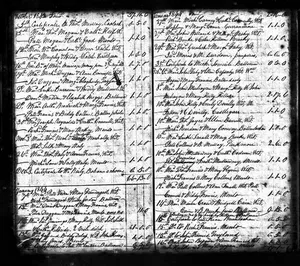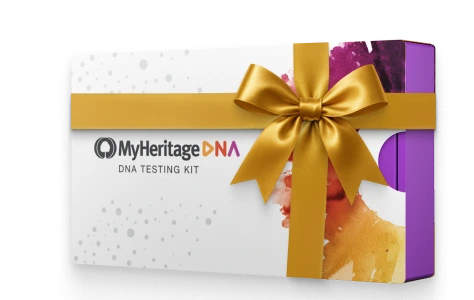
Church records are a valuable resource for Irish family history research, providing information that can help fill gaps in family lineages and trace ancestry as far back as the 17th century[1]. Existing Irish church records are far from complete and those that are may not necessarily accessible online. Nevertheless, in the absence of other sources, these records can be especially useful for researching Irish family history prior to the introduction of civil registrations in 1864.
Research your ancestors on MyHeritage
Information available in Irish church recordsInformation available in Irish church records

Irish church records typically include information for baptisms, marriages, and burials. The specific details vary depending on the church denomination and time period. For example, burial records are more commonly found in the registers of the Church of Ireland (CoI), while Roman Catholic parishes were less consistent in maintaining burial records. This limitation notwithstanding Irish church records will generally include[2]:
Baptism Records
- Date of baptism
- Name of the child
- Names of parents (in Roman Catholic registers this often includes the mother's maiden name)
- Names of sponsors or godparents
- Family address
- Name of the officiating clergyman
Marriage Records
- Date of marriage
- Names of each spouse
- Names of witnesses
- Names of the parents of each spouse
- Residences of each spouse
- Age and occupation of each spouse
- Name of the officiating clergyman
Burial Records
- Date of burial
- Name of the deceased
- Address of the deceased
- Age of the deceased
The level of detail in these records can vary significantly, even within a single parish over time. Some registers may contain additional notes or comments, such as subsequent marriage details written in the margins of baptismal records. Also, CoI parish records may also include vestry books. These documents may include minutes of parish meetings and information about individuals' roles in the parish[3].
Irish church records by religious denomination and countryIrish church records by religious denomination and country
The contents, completeness and current accessibility of Church records in Ireland vary according to the religious denomination of the individual concerned. You should consult specific Wiki articles which provide details on these considerations for each of the major churches in Ireland: Roman Catholic, Church of Ireland (CoI), Methodist and Presbyterian. These articles also include information on the history of each religion in Ireland, as well as the gaps in the current availablity of their records. This information can provide valuable context, as well as guidance, for your church records search.
Also, researchers need to take into account that finding and utilising Irish church records will vary depending on whether the record today falls within the jurisdiction of the Republic of Ireland or Northern Ireland, the latter forming part of the United Kingdom.
Strategies to maximise the value of Irish church recordsStrategies to maximise the value of Irish church records
Making best use of Irish church records requires preparation and patience. Start your search with these tips[4]:
- Focus first on the most recent ancestor for whom you already have some basic information.
- Determine that ancestors' religion and the locations with which they are associated.
- Because Irish surnames have many spelling variations cast your net wide enough to cover all the possible name versions. To give just one, perhaps extreme, example the various forms associated with the surname Cafferky include O'Cafferky, McCafferky, McCafferty, Mac Eachmharcaigh, Ceafarcaigh, Ó Ceamharcaigh, Ó Ceafarcaigh, Cafferkey and Mac Ceamharcaigh[5].
- Concentrate first on the record types (baptism, marriage or burial) which are most likely to be both accessible and will advance your specific research, building on the information that you already have.
- Use your detective skills, paying attention to other information in the church records, such as the ancestor's occupation, residences and relationships to help you "connect the dots".
- When you've sourced useful church records on your most promising ancestor, you can try working backwards to church records on earlier, or related, ancestors using the first ancestor as your starting point.
Research more on Irish church recordsResearch more on Irish church records
- Irish church records-Roman Catholic Church
- Irish church records-Church of Ireland
- Irish church records-Methodist Church
References
- ↑ Caitlin.bain@eneclann. (2022, March 7). A guide to church records in Ireland. Irish Family History Centre.
- ↑ What information is contained in the Church Records? - irish genealogy. (n.d.).
- ↑ The list of parish registers. (n.d.).
- ↑ Church Records. Roots Ireland. (n.d.).
- ↑ Irish surnames index. dúchas.ie. (n.d.).

